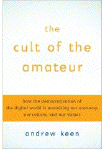Blame the bloggers
Tuesday, February 27, 2007 by Dave Winer.
On the plane last night I read the first half of the galley of Andrew Keen's upcoming book entitled The Cult of the Amateur. I'm not the first to mention the book, Dan Farber wrote about it in his reflection on the first decade of blogging. ![]()
 Keen's work is a book-length sneer at most of what we hold dear. He blames bloggers and podcasters for the demise of professional media, as if somehow we're responsible for the endless coverage of Anna Nicole Smith on cable news, for Judith Miller's complicity with the Bush White House, for the shameless way the press, without notable exception, hounded Howard Dean out of the 2004 presidential race. Of course we're not responsible for any of those horrors, and Keen should, somewhere in this book, consider that blogging might be an attempt to solve some of the problems caused by a vacuum of responsible high-integrity journalism. I think, for the most part, bloggers would be happy to have real journalists at work at the professional pubs. I want more Woodward and Bernstein, more of the kind of investigative journalism done by the SF Chronicle following steroids in baseball, more reporters who are willing to go to jail for their principles, but I'm usually disappointed. There are countless examples in Keen's book where he credits the pros for doing thorough work, when their work is anything but thorough. (And he owes a huge apology to Josh Wolf, a blogger who is in jail right now, for exactly the causes Keen extols.)
Keen's work is a book-length sneer at most of what we hold dear. He blames bloggers and podcasters for the demise of professional media, as if somehow we're responsible for the endless coverage of Anna Nicole Smith on cable news, for Judith Miller's complicity with the Bush White House, for the shameless way the press, without notable exception, hounded Howard Dean out of the 2004 presidential race. Of course we're not responsible for any of those horrors, and Keen should, somewhere in this book, consider that blogging might be an attempt to solve some of the problems caused by a vacuum of responsible high-integrity journalism. I think, for the most part, bloggers would be happy to have real journalists at work at the professional pubs. I want more Woodward and Bernstein, more of the kind of investigative journalism done by the SF Chronicle following steroids in baseball, more reporters who are willing to go to jail for their principles, but I'm usually disappointed. There are countless examples in Keen's book where he credits the pros for doing thorough work, when their work is anything but thorough. (And he owes a huge apology to Josh Wolf, a blogger who is in jail right now, for exactly the causes Keen extols.) ![]()
Further, he says over and over that Craigslist is responsible for undermining the business model of newspapers. But he doesn't ask why the newspapers failed to embrace the Internet, making Craigslist necessary. What's the lesson here? That the news industry is allowed to hold back progress? To what end? Sure Wikipedia has problems, but it also responds much faster than the older encyclopedias, and while I agree it's wrong to dismiss experience and scholarship, it's equally wrong to dismiss knowledge when it occurs in a person without the trappings of academia. The solution isn't to call the amateurs names, the new world requires thought, and Keen does not provide any. ![]()
His book, while based on an important and valuable premise, that Silicon Valley is too-much admired for the good of all of us, including the tech industry, fails to enlighten while he props up the egos of obsolete people and businesses. Each of his arguments is easily refuted, too easily. There's no food for thought in this book. I was ready for a work that would inspire a thoughtful response, because I like Andrew, at a personal level, but this book is beneath criticism. Back to the drawing board. ![]()